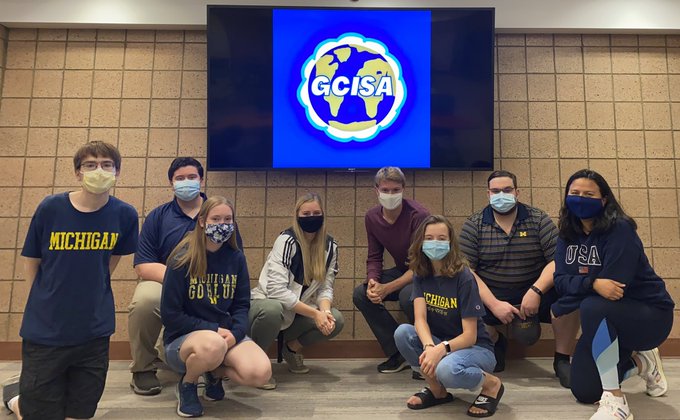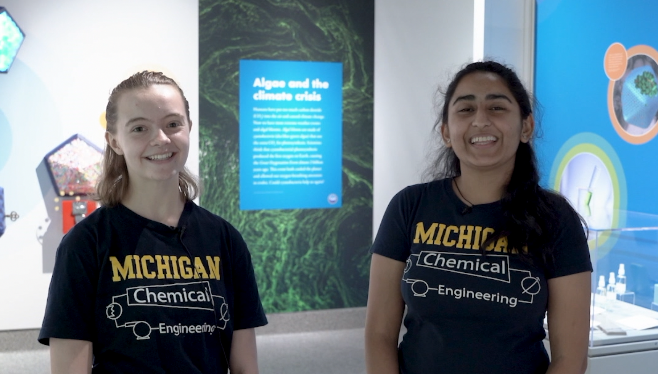Since the age of 11, Morgan Cobb has been determined to make a positive impact on the planet.
When the Society of Women Engineers at the University of Michigan hosted an outreach day for future engineers, 11-year old Morgan was awestruck. As she learned more about each engineering discipline, she became overwhelmed with the possibilities for problem solving and real-world impact.
“I remember thinking, ‘This is how you can change the world,’ and just feeling so empowered and overwhelmed with inspiration,” Morgan said. “I still get chills remembering just how in awe I was that day. It felt like literally anything was possible.”
Morgan views this realization as a critical point in her life that sparked her passion for creating a healthier global climate.
“From that day onwards, I decided I was going to be an engineer. For me, engineering offered a toolkit for problem solving, as well as optimism to combat the despair brought on by the increasing frequency of climate-related disasters and other world events.”
With this goal in mind, Morgan entered the University of Michigan as a freshman studying Chemical Engineering. Searching for a meaningful way to scale solutions for the benefit of the environment, she looked for student activities and resources that would help her achieve that goal.
 Shortly upon arriving to U-M, Morgan joined the Global CO2 Initiative Student Association, (GCISA) where she and her team compete in Direct Air Capture (DAC) design competitions using their DAC unit, CO2BALT.
Shortly upon arriving to U-M, Morgan joined the Global CO2 Initiative Student Association, (GCISA) where she and her team compete in Direct Air Capture (DAC) design competitions using their DAC unit, CO2BALT.
“The availability of climate tech resources and education here at the University of Michigan like the Global CO2 Initiative and Innovation for Impact: Climate Change drew me in to become more involved with entrepreneurship as a supplement to my engineering education, and deciding to center my career around climate technology.”
During Morgan’s sophomore year, she learned from fellow classmates about the Center for Entrepreneurship’s Innovation for Impact: Climate Change program.
“At that point I was a member of GCISA and becoming more interested in climate tech. Towards the end of 2021, I decided to apply for the 2022 cohort when I received an email from the CFE announcing that applications were open.”
Two weeks later, Morgan was accepted into the program and paired with Svante, a Canadian-based carbon-capture company, to work on a point-source carbon capture project.
“Working on a project with real-life implications was an incredible supplement to my engineering education. I learned a lot about negative emissions technologies both through my project with Svante as well as my classmates’ projects with their sponsors.”
This experience solidified Morgan’s interest in carbon capture and climate tech, while also allowing her to become familiar with the entrepreneurial mindset. With this passion ignited, she soon pursued an internship with the Glocal Co2 Intiative, where she worked as part of a multidisciplinary team to investigate the potential for carbon removal and storage in the Great Lakes region.
“Ultimately, we were able to quantify the potential for carbon removal and storage in the region and provided recommendations to the Great Lakes St. Lawrence Board of Governors and Premiers for the creation of a regional strategy for carbon management to accelerate the transition to net-zero in the region.”
According to Morgan, her experience with Innovation for Impact: Climate Change prepared her to excel in her work with the Global Co2 Initiative.

“Many of the removal methods we investigated and recommended coincided with the technologies we learned about in Innovation for Impact: Climate Change and were the focus of both my and the other sponsored projects.”
As part of her summer research with the Global CO2 Initiative, Morgan was able to conduct qualitative interviews with researchers, government workers, and CEOs of climate tech startups to gain insight into the carbon removal space.
“It was an incredible opportunity to connect with and learn from experts in the field, especially since it is so nascent and rapidly growing.”
Morgan’s work didn’t stop there. While finishing up the second semester of Innovation for Impact: Climate Change, she also currently leads a multidisciplinary student team to investigate the potential for freshwater carbon removal in the Great Lakes Region.
“It has been such an incredible experience to be able to be involved in carbon capture projects both in and out of the classroom, and my initial involvement with Innovation for Impact: Climate Change was pivotal in shaping my passion and involvement in the carbon removal space.”
In the future, Morgan aspires to build upon her current experience to make an even larger impact on the global environment.
“I plan to continue researching freshwater carbon removal, with the goal of demonstrating and scaling a carbon removal process that can be integrated into existing infrastructure. I plan to continue to work in the carbon removal space and center my career on accelerating the transition to net-zero.”
Want to learn more about Innovation for Impact: Climate Change? Click here to learn how you can get involved and help companies make a significant impact on the planet.

